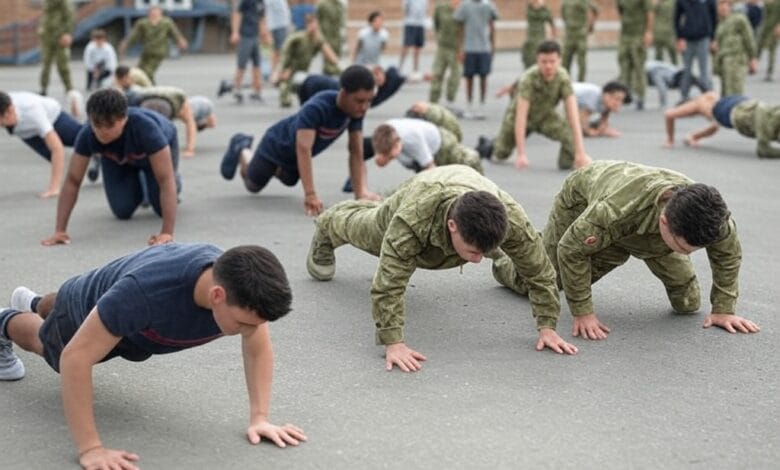
🇬🇧 Is It Time to Introduce Basic Military Training in UK Schools?
With escalating global tensions involving Russia, Ukraine, North Korea, and other nations, many are questioning whether the UK is prepared for potential large-scale conflicts. With British Army recruitment numbers at concerning lows, could introducing basic military training in schools be a solution?
A structured Youth National Defense Training Program (YNDT) could equip young individuals with essential military skills, ensuring the country has a trained reserve force in case of emergencies. Let’s explore how this could work.
🎯 What is the Youth National Defense Training Program (YNDT)?
The YNDT would be a mandatory training program for students aged 16-18, integrated into their final years of education. The program would aim to provide:
- 🏋️ Basic military training
- 🚨 Crisis management and emergency response skills
- 🖥️ Cyber defense and intelligence training
- ⛑️ Medical and survival skills
By the time students leave school, they would have a basic level of military preparedness, making them valuable in national defense or emergency situations.
🏗️ How Would the Program Work?
The YNDT would be a structured two-year program that runs alongside academic studies. Here’s an outline of its structure:
📜 Program Structure
| Age Group | Training Level | Key Skills Taught |
|---|---|---|
| 16-17 (Year 11-12) | Basic Training | 🏃 Fitness, discipline, survival skills, first aid, self-defense |
| 17-18 (Year 12-13) | Advanced Training | 🔫 Firearms handling, strategy, cyber defense, emergency response |
- 📅 Training Commitment: 1-2 days per week
- 🏕️ Summer Training Camp: 4-week immersive training
- 🎯 Options: Combat-focused or non-combat roles (e.g., logistics, cybersecurity, medics)
This structure ensures students gain hands-on experience while continuing their academic education.
🔍 Key Components of the Training
🏋️ 1. Physical & Mental Preparedness
- Military-style physical fitness training
- Mental resilience development (stress management, leadership, tactical thinking)
- Survival skills (navigation, shelter-building, food rationing)
🛡️ 2. Tactical & Defensive Training
- Self-defense & combat training
- Firearms safety & handling (optional for those opting in)
- Basic battlefield strategy (attack and defense tactics)
💻 3. Cyber & Intelligence Training
- Cybersecurity awareness & hacking prevention
- Emergency communication skills (radio operation, encryption basics)
🚑 4. Emergency Response & Medical Training
- Basic first aid & battlefield medicine
- Evacuation and crisis response training
- Training on chemical, biological, and nuclear (CBN) threats
These real-world skills would not only prepare students for military service if needed but also improve general crisis management capabilities in society.
🏆 Benefits of Implementing Basic Military Training in Schools
✅ Stronger National Defense: A prepared civilian force in case of emergency.
✅ Better Job Prospects: Develops leadership, teamwork, and discipline.
✅ Boosts Cybersecurity Readiness: Prepares young people for digital warfare.
✅ Increases National Unity: Encourages teamwork across different backgrounds.
✅ Supports Emergency Services: More citizens trained in first aid and crisis response.
Countries like Switzerland, Israel, and South Korea already implement similar programs with positive national defense outcomes.
🎓 Post-Training Opportunities
After completing YNDT, individuals can:
- 🎖️ Join the military reserves with fast-track career opportunities.
- 🎓 Receive scholarships or tax incentives for completing advanced training.
- 🖥️ Use cybersecurity and emergency response skills in civilian careers.
This program wouldn’t just be about war preparedness—it would create a better-trained, more resilient population.
🏛️ How Can This Be Implemented?
For a successful rollout, the UK government could:
- Start with a pilot program in select schools.
- Partner with the British Army and MOD for structured training.
- Recruit veterans and reservists as instructors.
- Invest in training infrastructure (facilities, digital security labs, etc.).
- Provide financial incentives for participation.
This would ensure a smooth integration into the education system while maximizing benefits.
⚠️ Potential Challenges & Concerns
🔹 Public Opposition: Would UK citizens support such a program?
🔹 Budgeting Issues: Military training isn’t cheap—where would funding come from?
🔹 Voluntary vs. Mandatory: Should it be compulsory, or should students opt in?
🔹 Ethical Concerns: Is it appropriate to train minors for combat roles?
While these challenges exist, they are not insurmountable. With the right planning, the program could be an effective national security initiative.
🎤 Final Thoughts: Should the UK Adopt This Program?
With rising global instability and declining army recruitment, introducing basic military training in schools could be a proactive solution to strengthen national defense and equip young people with essential life skills.
The real question remains: Would British society embrace this change?
💬 What do you think? Should the UK introduce a Youth National Defense Training Program? Let us know in the comments below!
📢 Share this article and join the debate!
🏛️ Support Change! If you believe this program could benefit the UK, propose it to your local MP and the Prime Minister—raising awareness among policymakers can lead to parliamentary discussions, potential policy reviews, and increased public dialogue on national defense preparedness.—your voice can help shape the future of national security!
📌 Find your local MP and contact them here: Find Your MP
📌 Write to the Prime Minister directly: Contact the Prime Minister




